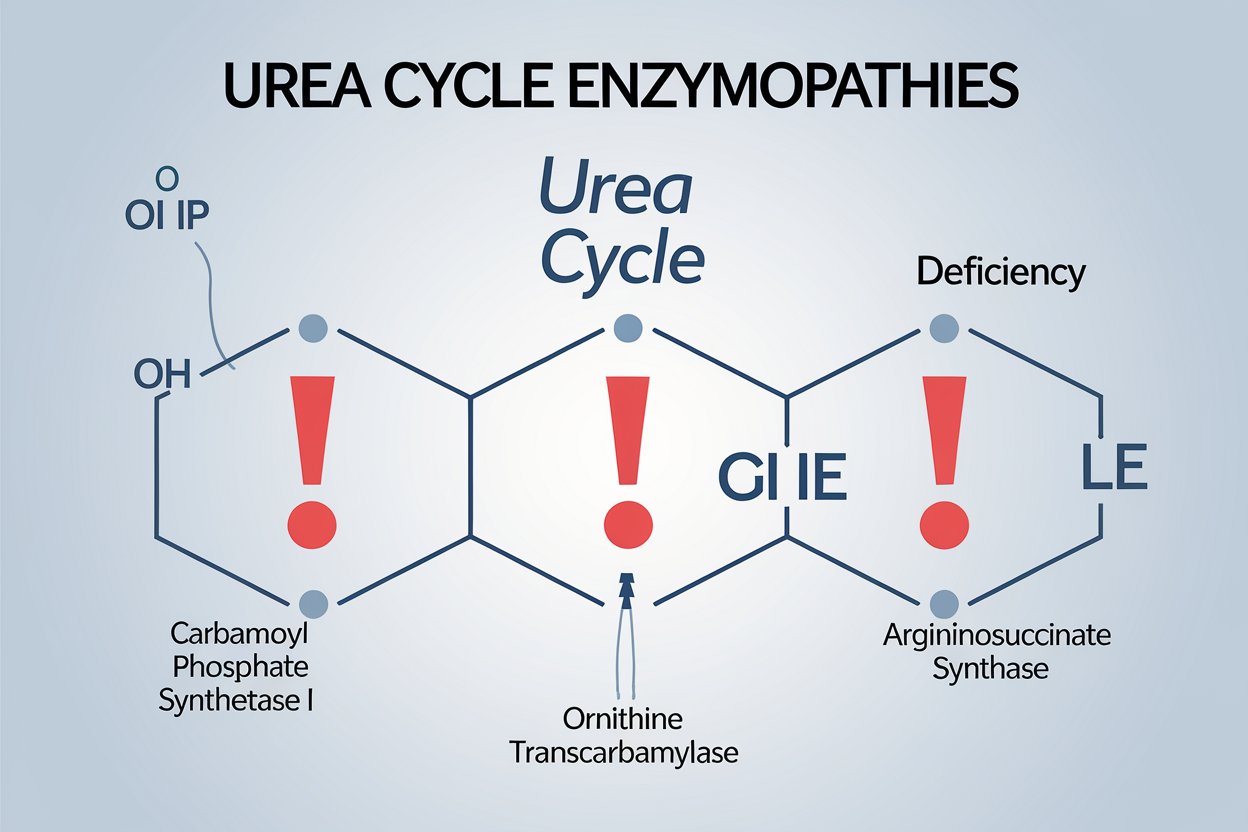
Urea Cycle Enzymopathies are rare genetic disorders that affect the body's ability to remove waste nitrogen. These conditions result from mutations in genes responsible for enzymes in the urea cycle, a critical process in the liver. Symptoms can range from mild to severe and may include vomiting, lethargy, seizures, and even coma. Early diagnosis and treatment are crucial to manage these disorders effectively. Treatment options often involve dietary restrictions, medications, and sometimes liver transplantation. Understanding the complexities of these disorders can help in managing them better and improving the quality of life for affected individuals.
Key Takeaways:
- Urea cycle enzymopathies are rare genetic disorders affecting ammonia removal. Early diagnosis, low-protein diet, and gene therapy research offer hope for better management and treatment.
- Living with urea cycle disorders requires regular monitoring, dietary management, support groups, and raising awareness for better outcomes and patient safety.
What are Urea Cycle Enzymopathies?
Urea cycle enzymopathies are rare genetic disorders that affect the body's ability to remove waste nitrogen. This process is crucial for converting toxic ammonia into urea, which the body can safely excrete. Here are some fascinating facts about these conditions.
-
Inherited Disorders: Urea cycle enzymopathies are inherited in an autosomal recessive manner, meaning both parents must carry the defective gene.
-
Six Main Enzymes: The urea cycle involves six main enzymes: carbamoyl phosphate synthetase I (CPS1), ornithine transcarbamylase (OTC), argininosuccinate synthetase (ASS1), argininosuccinate lyase (ASL), arginase (ARG1), and N-acetylglutamate synthase (NAGS).
-
OTC Deficiency: Ornithine transcarbamylase deficiency is the most common urea cycle disorder, affecting about 1 in 80,000 people.
-
Hyperammonemia: One of the primary symptoms of urea cycle disorders is hyperammonemia, a condition where ammonia builds up in the blood, leading to neurological damage.
-
Newborn Screening: Some regions include urea cycle disorders in newborn screening programs, allowing for early diagnosis and treatment.
Symptoms and Diagnosis
Understanding the symptoms and diagnostic methods for urea cycle enzymopathies can help in early detection and management.
-
Neonatal Onset: Severe forms of urea cycle disorders often present in the neonatal period with symptoms like lethargy, vomiting, and seizures.
-
Late-Onset: Milder forms may not appear until later in life, with symptoms such as headaches, confusion, and behavioral changes.
-
Blood Tests: Diagnosis often involves blood tests to measure ammonia levels and amino acids.
-
Genetic Testing: Confirmatory diagnosis is usually done through genetic testing to identify mutations in the urea cycle enzyme genes.
-
Liver Biopsy: In some cases, a liver biopsy may be performed to assess enzyme activity directly.
Treatment Options
Managing urea cycle enzymopathies requires a combination of dietary changes, medications, and sometimes more invasive treatments.
-
Low-Protein Diet: Patients are often placed on a low-protein diet to reduce ammonia production.
-
Nitrogen Scavengers: Medications like sodium phenylbutyrate and glycerol phenylbutyrate help remove excess nitrogen from the body.
-
Arginine and Citrulline Supplements: These amino acids can help bypass the defective enzymes in the urea cycle.
-
Liver Transplant: In severe cases, a liver transplant may be considered as it can provide a new source of functional urea cycle enzymes.
-
Emergency Treatment: Acute hyperammonemia requires immediate treatment with intravenous glucose and lipids to reduce protein breakdown.
Research and Future Directions
Ongoing research aims to improve the understanding and treatment of urea cycle enzymopathies.
-
Gene Therapy: Researchers are exploring gene therapy as a potential cure by correcting the defective genes.
-
Enzyme Replacement Therapy: This approach involves supplementing patients with the missing or deficient enzymes.
-
Newborn Screening Expansion: Efforts are underway to include more urea cycle disorders in newborn screening programs globally.
-
Patient Registries: International patient registries help track the natural history of these disorders and the effectiveness of treatments.
-
Clinical Trials: Numerous clinical trials are testing new drugs and therapies to manage urea cycle disorders better.
Living with Urea Cycle Enzymopathies
Living with a urea cycle disorder involves ongoing management and support.
-
Regular Monitoring: Patients require regular monitoring of ammonia levels and nutritional status.
-
Dietary Management: Working with a dietitian is crucial to ensure proper nutrition while managing protein intake.
-
Support Groups: Joining support groups can provide emotional support and practical advice for patients and families.
-
Education and Awareness: Raising awareness about urea cycle disorders can lead to earlier diagnosis and better outcomes.
-
Emergency Plans: Having an emergency plan in place for hyperammonemia episodes is essential for patient safety.
Final Thoughts on Urea Cycle Enzymopathies
Understanding urea cycle enzymopathies is crucial for managing these rare genetic disorders. These conditions, caused by enzyme deficiencies, can lead to severe health issues if not diagnosed early. Symptoms often include hyperammonemia, lethargy, and vomiting. Early detection through newborn screening and genetic testing can significantly improve outcomes. Treatment typically involves dietary management, medications to reduce ammonia levels, and sometimes liver transplantation.
Raising awareness about these disorders can help families seek timely medical advice. Researchers continue to explore new therapies, offering hope for better management and potential cures. If you suspect a urea cycle disorder, consult a healthcare professional for proper diagnosis and treatment.
By staying informed, you can make a difference in the lives of those affected by these challenging conditions. Knowledge truly is power when it comes to rare diseases.
Frequently Asked Questions
Was this page helpful?
Our commitment to delivering trustworthy and engaging content is at the heart of what we do. Each fact on our site is contributed by real users like you, bringing a wealth of diverse insights and information. To ensure the highest standards of accuracy and reliability, our dedicated editors meticulously review each submission. This process guarantees that the facts we share are not only fascinating but also credible. Trust in our commitment to quality and authenticity as you explore and learn with us.
